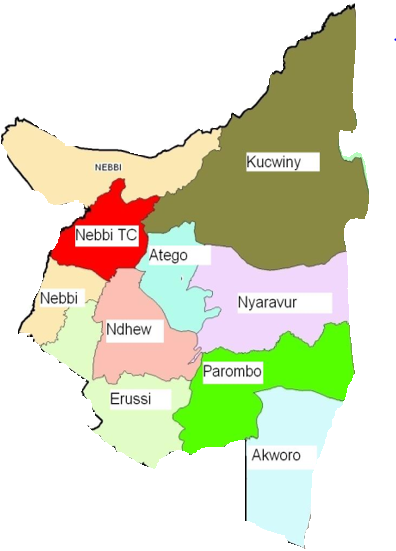
At independence, Nebbi District located in the North-Western part of Uganda, was part of the then West Nile District until 1974 when it was divided into North Nile, Central Nile and South Nile Districts. South Nile became Nebbi in 1980. Nebbi is currently bordered to the North by Madi Okollo District, Zombo to the west, Pakwach to the East and South – East and Democratic Republic of Congo (DRC) to the West. In 2010, 2017 counties of Okoro and Jonam County were split off Nebbi to form Zombo and Pakwach District respectively, leaving Nebbi with one County of Padyere.
Nebbi District is currently divided into 13 Lower Local Governments i.e. Eleven (11) rural Sub-Counties i.e. (Akworo, Kucwiny, Ndhew, Atego, Nebbi, Erussi, Parombo, Padwot, Alala, Acana and Jupangira), two (2) Town Council i.e. (Parombo and Nyaravur-Angal Town Councils) and a Municipal Council i.e. (Nebbi Municipal with three divisions of Thatha, Abindu and Central).
The District has 60 parishes, 596 villages. Nebbi Municipality has got three (3) Divisions, nine (9) Wards, 46 cells.
The District Headquarters is located in Nebbi Municipal along Nebbi – Paidha road. There is a small airstrip (currently not in function) in Koch parish, Nebbi Sub County near Nebbi Municipal, which can be reached using commercial flights from Entebbe airport.
The west escapement of the rift valley overlooks both the district and the Municipal headquarters in Nebbi Town.
Nebbi District has a population of 298,300 (Male: 48.7%; Female: 51.3%), 153,000 female, 145,300 male (Population projection). The main languages are Alur. Majority of the District population is engaged in subsistence farming. Much of what is produced is consumed at the household level and less than 40% is marketed. The main crops grown are cotton, coffee, simsim, sorghum, millet, sweet potatoes, beans, cassava, maize and vegetables. Argo-processing is done small scale.The District currently has 91 Government aided primary and non-formal education schools with a total enrollment of 40,422. Privately Owned Primary Schools are 46. There are 17 Secondary Schools (10 Private and 7 Government), one (1) unit for Special Needs Education Centres and 64 Early Child Development centres. There are four (4) renown Business Technical Vocational Education Training Institutions (BTVET) i.e. Comboni Technical – Angal, Women Vocational tTraining Centre – Goli, Smart-up Youth Training Centre and Akaba Vocational School.
Nebbi District has got 26 health facilities both public and private non for profit. There are two (2) Hospitals, one (1) Health Centre HIV, (12) Health Centre III and 11 Health Centre II.
The dominant religious denominations are the Catholic and Anglican churches. However, several smaller groups also exist. About 80% of the population belongs to the Roman Catholic Church while the Anglican society accounts for about 15% and the rest of the population is in other beliefs.


